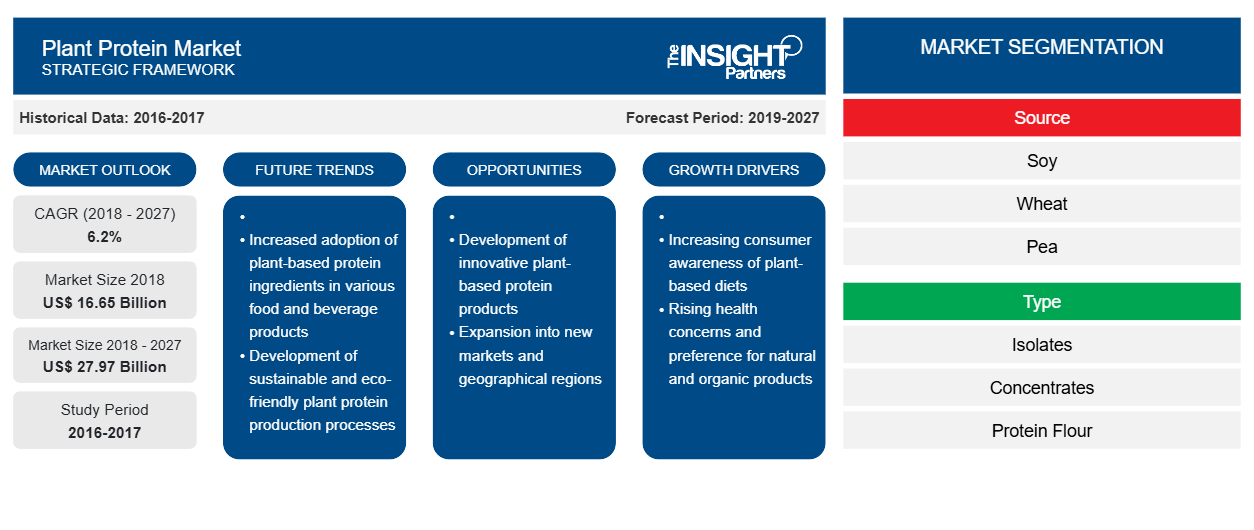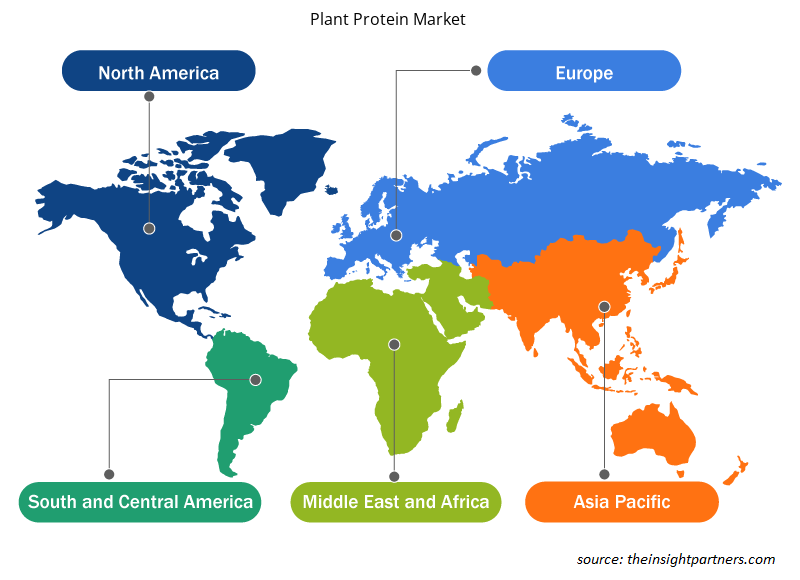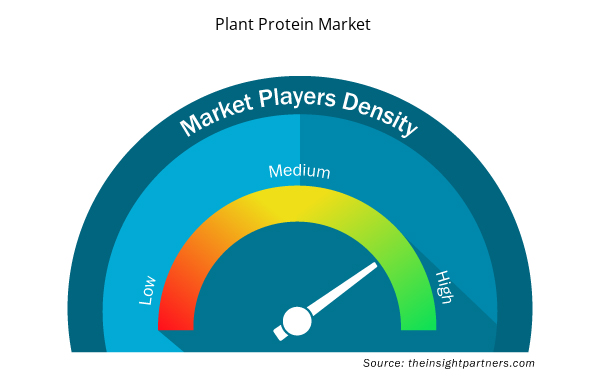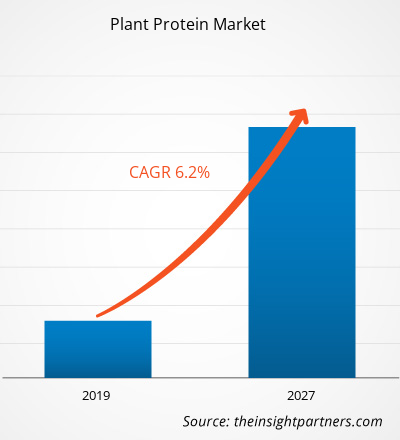The plant protein market was valued at US$ 16,653.6 million in 2018 and is projected to reach US$ 27,965.9 million by 2027; it is expected to grow at a CAGR of 6.2% from 2019 to 2027.
Proteins are vital nutrients required by the human body, which are made up of amino acids. Plant proteins are obtained from various plant sources such as soy, wheat, pea, nuts, and seeds, among others. Various plant sources such as lentils, chickpeas, peanuts, almonds, spirulina, quinoa, and chia seed provide a high amount of proteins. Since plant proteins are low in calories, they can be consumed as a substitute for animal protein for weight loss. Growing demand for plant-based food coupled with rising consumer interest in high protein food is the key factors boosting the demand for plant protein market growth globally.
The plant protein market growth in APAC is expected to grow at the highest CAGR during the forecast period. The plant protein market growth in this region is mainly attributed to the increase in disposable income with changing lifestyles are the major driving factors for plant protein in Asia Pacific. Rapid growth in the food & beverage industry in the developed and developing Asian countries such as China, India, and Japan provides a huge market opportunity for plant protein manufacturers as it is extensively used in the products such as protein beverages, dairy alternatives, meat alternatives, and protein bars
The rising disposable income of people in developed and developing countries such as India, China, and Australia has led to a huge demand for plant protein in this region.
Customize This Report To Suit Your Requirement
You will get customization on any report - free of charge - including parts of this report, or country-level analysis, Excel Data pack, as well as avail great offers and discounts for start-ups & universities
Plant Protein Market: Strategic Insights

- Get Top Key Market Trends of this report.This FREE sample will include data analysis, ranging from market trends to estimates and forecasts.
Customize This Report To Suit Your Requirement
You will get customization on any report - free of charge - including parts of this report, or country-level analysis, Excel Data pack, as well as avail great offers and discounts for start-ups & universities
Plant Protein Market: Strategic Insights

- Get Top Key Market Trends of this report.This FREE sample will include data analysis, ranging from market trends to estimates and forecasts.
Market Insights
Rising Consumer Awareness About Protein-Rich Food to Fuel Plant Protein Market Growth
Proteins play a key role in transporting molecules throughout the body by helping in cell repair and protecting the body from viruses and bacteria. It also promotes proper growth and development in children, teenagers, and pregnant women.
Various studies show that eating a protein-rich diet help gain muscle mass and strength and prevent muscle loss during weight management or weight loss program.
People consuming more protein tend to maintain bone mass better and have a much lower risk of osteoporosis and fractures. High protein intake has resulted in boosting metabolism that results in the burning of a high amount of calories. This further helps in proper weight management and weight loss. These benefits of protein are attracting consumers toward protein-rich food and beverages available in the market. This further creates a huge demand for plant proteins globally.
A protein-rich food is considered one of the strongest trends in the food and beverage industry. Following the protein trend in food, the food and beverage manufacturers are trying to make nutritional food products. Rising consumer awareness regarding effective ways to achieve weight loss, anti-aging, and other health-related issues through the consumption of protein-rich food is boosting the demand for plant proteins. Moreover, growing health and wellness trends has created a strong demand for functional and fortified food and beverages significantly over the past years. Thus, the rising consumer awareness about protein-rich food is expected to fuel plant protein market growth
Source-Based Insights
Based on source, the plant protein market is categorized into soy, wheat, pea, and others. The soy segment accounted for the largest market share in 2018; however, the pea segment is expected to register the highest CAGR in the market during the forecast period. Soy protein isolate is a highly refined form of soy protein, with a protein content of a minimum 90%. It is made from defatted soy flour from which most of the non-protein components, including fats and carbohydrates, are removed. Soy protein powder is made from defatted soybean flakes washed in either alcohol or water to remove the sugars and dietary fibers. They are then dehydrated and ground into powder. Soy protein powder is used to make infant soy formulae, as well as a variety of meat and dairy alternatives. Soy protein concentrates typically contain 70% soy protein and is basically defatted soy flour without the water-soluble carbohydrates. This form of protein is made by removing part of the carbohydrates from dehulled and defatted soybeans. Soy flour is made by grinding soybeans into a fine powder.
Type-Based Insights
Based on type, the plant protein market is segmented into isolates, concentrates, and protein flour. The concentrates segment accounted for the largest market share in 2018. Plant protein concentrates are produced by extracting protein from various sources such as soy, wheat, pea, quinoa, oats, beans, and nuts. These typically supply 60–80% protein, with the remaining 20–40% composed of fat and carbs. The concentrated plant protein is the least processed type of protein powder. Plant protein in the concentrated form helps the muscles recover quickly from heavy exercise as it is absorbed quickly by the body. Therefore, easy availability of plant protein concentrates coupled with lower prices compared to plant protein isolates are the key factors boosting the market. Plant protein concentrate tends to be the cheapest option, but they offer the least amount of protein compared to plant protein isolates because they contain more of other ingredients. These extra ingredients can include fat, cholesterol, lactose, and gluten. The consumers trying to limit the fat intake or have a sensitive digestive system should avoid plant protein concentrates.
Application-Based Insights
Based on type, the plant protein market is segmented into protein beverages, dairy alternatives, meat alternatives and meat extenders, protein bars, bakery and other applications. The meat alternatives and meat extenders segment accounted for the largest market share in 2018. Meat alternative products include tofu, tempeh, textured vegetable protein, seitan, and Quorn, among others. These products have taste, appearance, and texture similar to that of poultry, meat, and fish products. They are manufactured using grain- and plant-based ingredients to replace animal-based proteins and minerals (specifically calcium), which aid in reducing cholesterol levels, preventing menopausal difficulties, and other related ailments. Plant proteins are extensively used in the production of meat alternatives. Beans and legumes are affordable sources of plant protein that serve as a meat substitute. Soy is also among the major source for producing meat alternatives. Pea protein isolates are mainly used by meat-alternative manufacturers such as Daiya, Gardein, Ben & Jerry's, Beyond Meat, Just Mayo, and Ripple Foods, among others. Therefore, surge in demand and production for meat alternatives results in higher demand for plant proteins. The demand for meat alternatives is increasing due to growing health concerns among consumers and growing preference for vegan food. Further, rising obesity levels due to the consumption of meat and meat products have led to an increasing consumer preference for meat substitutes.
A few players operating in the plant protein market are Archer Daniels Midland Company; Axiom Foods, Inc.; Burcon NutraScience Corporation; Cargill, Incorporated; E. I. Du Pont De Nemours and Company; Glanbia plc; Ingredion Incorporated; Kerry Group; Koninklijke DSM N.V.; and Roquette Frères. The key companies implement mergers and acquisitions, and research and development strategies to expand their customer base and gain significant share in the global market, which also allows them to maintain their brand name globally.
Plant Protein Market Regional Insights
Plant Protein Market Regional Insights
The regional trends and factors influencing the Plant Protein Market throughout the forecast period have been thoroughly explained by the analysts at Insight Partners. This section also discusses Plant Protein Market segments and geography across North America, Europe, Asia Pacific, Middle East and Africa, and South and Central America.

- Get the Regional Specific Data for Plant Protein Market
Plant Protein Market Report Scope
| Report Attribute | Details |
|---|---|
| Market size in 2018 | US$ 16.65 Billion |
| Market Size by 2027 | US$ 27.97 Billion |
| Global CAGR (2018 - 2027) | 6.2% |
| Historical Data | 2016-2017 |
| Forecast period | 2019-2027 |
| Segments Covered |
By Source
|
| Regions and Countries Covered | North America
|
| Market leaders and key company profiles |
Plant Protein Market Players Density: Understanding Its Impact on Business Dynamics
The Plant Protein Market market is growing rapidly, driven by increasing end-user demand due to factors such as evolving consumer preferences, technological advancements, and greater awareness of the product's benefits. As demand rises, businesses are expanding their offerings, innovating to meet consumer needs, and capitalizing on emerging trends, which further fuels market growth.
Market players density refers to the distribution of firms or companies operating within a particular market or industry. It indicates how many competitors (market players) are present in a given market space relative to its size or total market value.
Major Companies operating in the Plant Protein Market are:
- Ingredion Incorporated
- Archer Daniels Midland Company
- Axiom Foods, Inc.
- Burcon NutraScience Corporation
- Cargill, Incorporated
Disclaimer: The companies listed above are not ranked in any particular order.

- Get the Plant Protein Market top key players overview
Report Spotlights
- Progressive industry trends in the plant protein market to help players develop effective long-term strategies
- Business growth strategies adopted by developed and developing markets
- Quantitative analysis of the plant protein market from 2018 to 2027
- Estimation of global demand for plant protein
- PEST analysis to illustrate the efficacy of buyers and suppliers operating in the industry
- Recent developments to understand the competitive market scenario
- Market trends and outlook as well as factors driving and restraining the growth of the plant protein market
- Assistance in decision-making process by highlighting market strategies that underpin commercial interest, leading to the market growth
- The size of the plant protein market size at various nodes
- Detailed overview and segmentation of the market, as well as the plant protein industry dynamics
- Size of the plant protein market in various regions with promising growth opportunities
- Historical Analysis (2 Years), Base Year, Forecast (7 Years) with CAGR
- PEST and SWOT Analysis
- Market Size Value / Volume - Global, Regional, Country
- Industry and Competitive Landscape
- Excel Dataset


- Grant Management Software Market
- Lyophilization Services for Biopharmaceuticals Market
- Hydrogen Storage Alloys Market
- Public Key Infrastructure Market
- Educational Furniture Market
- HVAC Sensors Market
- Glycomics Market
- Electronic Toll Collection System Market
- Data Annotation Tools Market
- Ketogenic Diet Market

Report Coverage
Revenue forecast, Company Analysis, Industry landscape, Growth factors, and Trends

Segment Covered
Source, Type, and Application

Regional Scope
North America, Europe, Asia Pacific, Middle East & Africa, South & Central America

Country Scope
Argentina, Australia, Brazil, Canada, China, France, Germany, India, Italy, Japan, Mexico, Russian Federation, Saudi Arabia, South Africa, South Korea, United Arab Emirates, United Kingdom, United States
Frequently Asked Questions
The major reason that are driving the global plant protein market are as follows: Health benefits associated with plant protein consumption: Plant-based diets are rich in nutrients like protein, magnesium, potassium, and vitamins K and C, which can improve muscle and bone health in people of all ages. Also, plant protein contains sulfur amino acids and tryptophan. These nutrients helps the body to make proteins and certain brain-signaling chemicals.
Rising consumer awareness about protein-rich food: Proteins are building blocks to maintain the structure and functions of the human body. Proteins are made up of amino acids that are attached by peptide bonds in long chains. There are 20 different kinds of amino acids linked together that determines the role of protein in the human body. Proteins play a key role in transporting molecules throughout the body by helping in cell repair and protecting the body from viruses and bacteria. It also promotes proper growth and development in children, teenagers, and pregnant women.
Global plant protein’s concentrates segment is expected to grow by a good market share. Based on type, the plant protein market is categorized into isolates, concentrates, and protein flour. These forms of plant protein are extensively used in the food and beverage industry to enhance the nutritional content of the food. The market for all the three types of plant protein is driven by various factors such as rising awareness about protein-rich diets and consumer shift towards a vegan diet globally. The high nutritional content of plant protein has exacerbated its adoption trend. The concentrates segment dominated the global plant protein market and is expected to register an exceptional growth rate during the forecast period.
The plant protein market was dominated by North America at a global level. North America comprises developed and developing countries such as the US, Canada, and Mexico. North America is likely to account for a remarkable share of the plant protein market during the forecast period. Consumers in the US and Canada are shifting their preferences toward a healthy lifestyle and prefer products that provide health benefits. While most people in North America are becoming physically active, obesity still exists as a major concern, leading to chronic cardiovascular diseases (CVD), high blood pressure, and cholesterol among masses.
Trends and growth analysis reports related to Food and Beverages : READ MORE..
The List of Companies - Plant Protein Market
- Ingredion Incorporated
- Archer Daniels Midland Company
- Axiom Foods, Inc.
- Burcon NutraScience Corporation
- Cargill, Incorporated
- E. I. Du Pont De Nemours and Company
- Glanbia plc
- Kerry Group
- Koninklijke DSM N.V.
- Roquette Frères

 Get Free Sample For
Get Free Sample For